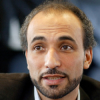Tariq Ramadan

Tariq Ramadan
Tariq Ramadanis a Swiss academic, philosopher and writer. He is the professor of Contemporary Islamic Studies in the Faculty of Oriental Studies at St Antony's College, Oxford and also teaches at the Oxford Faculty of Theology. He is a visiting professor at the Faculty of Islamic Studies, the Université Mundiapolisand several other universities around world. He is also a senior research fellow at Doshisha University. He is the director of the Research Centre of Islamic Legislation and Ethics, based in...
NationalitySwiss
ProfessionWriter
Date of Birth26 August 1962
CountrySwitzerland
I am saying the same to Muslims in the global South, telling them: "Just ignore what is done." However, in the Southern countries they are not living in a comfortable society like you and me. They deal with unemployment, corruption, and surviving. For the majority of them, their religion is helping them survive.
Emancipation can only come from within; it cannot be dictated by someone else. A law banning the wearing of headscarves changes nothing, except perhaps external appearance. Naturally, Islamic feminism must also include the right to education, to work and the freedom to select one's own husband.
Islam, as a religion, has been established in France for a long time, and the religious question has been resolved in this country. Islam does not threaten France's future in any way.
The only way to resist colonialism is through education.
Muslims must decide, lest they end up divided by the very religion that calls upon them to unite.
When I am talking to people from Germany, we should know that there are certain things and certain histories that are very important for people. If you look at all the Muslims living in the West, they didn't react in a violent way. They don't like what they saw but they are citizens like you and me and they look at it and say: "This is a silly video but we are not going to react."
Violence against embassies and civilians must be categorically condemned. At the same time, we must attempt to understand why such events occur.
The message of Islam asks you to be intellectually, spiritually, socially, and politically independent
We want to tell people how great Islam is yet we are not great Muslims.
51% of the French people - who are not very religious - were thinking that what "Charlie Hebdo" did was unwise. They aren't asking for a law to prevent Charlie Hebdo from publishing caricatures, but they are calling on its editors to be a bit more sensible.
The strength of democratic societies relies on their capacity to know how to stand firm against extremism while respecting justice in the means used to fight terrorism.
Fear and its accompanying emotional reactions have become part of the public mindset. Such reactions, while often legitimate, are also being exploited with increasing frequency for political ends.
Being Muslim has become synonymous with pointed questions, with tension and mistrust, even with conflict. It has become a global phenomenon with profound consequences for inter-communal relations, political rhetoric and policies at the local, regional, national and international level.
Nevertheless, I have no political agenda whatsoever, even though some might think the contrary.